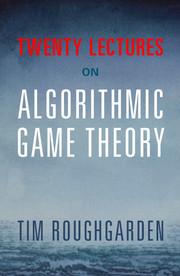Book contents
- Frontmatter
- Dedication
- Contents
- Preface
- 1 Introduction and Examples
- 2 Mechanism Design Basics
- 3 Myerson's Lemma
- 4 Algorithmic Mechanism Design
- 5 Revenue-Maximizing Auctions
- 6 Simple Near-Optimal Auctions
- 7 Multi-Parameter Mechanism Design
- 8 Spectrum Auctions 97
- 9 Mechanism Design with Payment Constraints 113
- 10 Kidney Exchange and Stable Matching
- 11 Selfish Routing and the Price of Anarchy
- 12 Over-Provisioning and Atomic Selfish Routing
- 13 Equilibria: Definitions, Examples, and Existence
- 14 Robust Price-of-Anarchy Bounds in Smooth Games
- 15 Best-Case and Strong Nash Equilibria
- 16 Best-Response Dynamics
- 17 No-Regret Dynamics
- 18 Swap Regret and the Minimax Theorem
- 19 Pure Nash Equilibria and PLS-Completeness
- 20 Mixed Nash Equilibria and PPAD-Completeness
- The Top 10 List
- Hints to Selected Exercises and Problems
- Bibliography
- Index
The Top 10 List
Published online by Cambridge University Press: 05 August 2016
- Frontmatter
- Dedication
- Contents
- Preface
- 1 Introduction and Examples
- 2 Mechanism Design Basics
- 3 Myerson's Lemma
- 4 Algorithmic Mechanism Design
- 5 Revenue-Maximizing Auctions
- 6 Simple Near-Optimal Auctions
- 7 Multi-Parameter Mechanism Design
- 8 Spectrum Auctions 97
- 9 Mechanism Design with Payment Constraints 113
- 10 Kidney Exchange and Stable Matching
- 11 Selfish Routing and the Price of Anarchy
- 12 Over-Provisioning and Atomic Selfish Routing
- 13 Equilibria: Definitions, Examples, and Existence
- 14 Robust Price-of-Anarchy Bounds in Smooth Games
- 15 Best-Case and Strong Nash Equilibria
- 16 Best-Response Dynamics
- 17 No-Regret Dynamics
- 18 Swap Regret and the Minimax Theorem
- 19 Pure Nash Equilibria and PLS-Completeness
- 20 Mixed Nash Equilibria and PPAD-Completeness
- The Top 10 List
- Hints to Selected Exercises and Problems
- Bibliography
- Index
Summary
1. The second-price single-item auction. Our first example of an “ideal” auction, which is dominant-strategy incentive compati ble (DSIC), welfare maximizing, and computationally efficient (Theorem 2.4). Single-item auctions already show how small design changes, such as a first-price vs. a second-price payment rule, can have major ramifications for participant behavior.
2. Myerson's lemma. For single-parameter problems, DSIC mechanism design reduces to monotone allocation rule design (Theorem 3.7). Applications include ideal sponsored search auctions (Section 3.5), polynomial-time approximately optimal knapsack auctions (Theorem 4.2), and the reduction of expected revenue maximization with respect to a valuation distribution to expected virtual welfare maximization (Theorem 5.4).
3. The Bulow-Klemperer theorem. In a single-item auction, adding an extra bidder is as good as knowing the underlying distribution and running an optimal auction (Theorem 6.5). This result, along with the prophet inequality (Theorem 6.1), is an important clue that simple and prior-independent auctions can be almost as good as optimal ones.
4. The VCG mechanism. Charging participants their externalities yields a DSIC welfare-maximizing mechanism, even in very general settings (Theorem 7.3). The VCG mechanism is impractical in many real-world applications, including wireless spectrum auctions (Lecture 8), which motivates simpler and indirect auction formats like simultaneous ascending auctions (Section 8.3).
5. Mechanism design without money. Many of the most elegant and widely deployed mechanisms do not use payments. Examples include the Top Trading Cycle mechanism (Theorems 9.7 and 9.8), mechanisms for kidney exchange (Theorem 10.1), and the Gale-Shapley stable matching mechanism (Theorems 10.5, 10.7, and 10.8).
6. Selfish routing. Worst-case selfish routing networks are always simple, with Pigou-like networks maximizing the price of anarchy (POA) (Theorems 11.1 and 11.2). The POA of selfish routing is therefore large only when cost functions are highly nonlinear, corroborating empirical evidence that network over- provisioning leads to good network performance (Section 12.1).
7. Robust POA Bounds. All of the proofs of POA bounds in these lectures are smoothness arguments (Definition 14.2). As such, they apply to relatively permissive and tractable equilibrium concepts like coarse correlated equilibria (Theorem 14.4).
8. Potential games. In many classes of games, including rout ing, location, and network cost-sharing games, players are inadvertently striving to optimize a potential function.
- Type
- Chapter
- Information
- Twenty Lectures on Algorithmic Game Theory , pp. 299 - 300Publisher: Cambridge University PressPrint publication year: 2016



